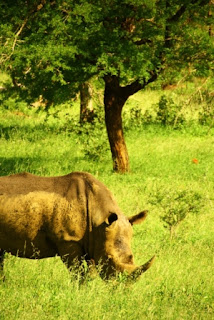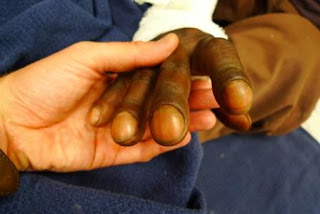Sometimes I feel as if I am on one long holiday. Then again, I don’t think I have ever worked so hard. The day to day pressures are huge and involve a lot of self discipline. There is no senior to check if we have done the job “correctly,” or family member asking what on earth is going on with their loved one. In fact, there is very little accountability and an acceptance from lay people that the doctor is always right, which, as we all know is not always true. However, because of this I think there is an even greater importance for us as clinicians to feel responsible for our patients. One has to think: “What would I want done for my family/friend/lover?” We are limited to what we can do a lot of the time, but there are many resources at our fingertips to help.
 |
| (left to right) Ben, Sofia, Tom (medical student), Alvin and Hannah - all enjoying a spot of Sunday afternoon jazz. |
So, why does it all feel like a massive vacation? I think the weekends away exploring this beautiful country have something to do with it. The past two weeks I stayed with my lovely friends: Alvin, Hannah, Ben and Sofia. All four are British doctors – two of them have been here over a year now and the others have just arrived. I didn’t just take time off to go party with them in Durban; I went to spend some time at the maternity hospital where Hannah works, to improve my caesarean section skills. In seven days I performed eighteen operations by myself as well as assisting several others. It isn’t the most complicated piece of surgery in the world, however, there are plenty of complications, not to mention that fact that you are dealing with at least two lives. I say at least: I delivered two sets of twins.
 |
| Rhino in Kwazulu Natal |
I was in two minds about developing my surgical skills. When I started this job just over a year ago, there was an expectation by myself and colleagues that I would be proficient at performing “caesers” within a few months of starting. However, a lack of doctors meant that there wasn’t really time to train me and my other skills were needed elsewhere in the hospital. As more medics arrived it soon transpired that I was the only one that could not “cut.” As a result I spent some time in theatre with my colleagues assisting with the operations. However, as everybody bar me can cut, there isn’t really a need for me to as well. Before, the need was there to help relieve the strain of my colleagues as it can be a bit of a work out to extract a baby from the womb. Secondly, there was the prospect of some fresh blood arriving, much like I did last year, with minimal obstetric experience. Unfortunately, they never arrived due to bureaucratic delays in the Eastern Cape.
Without this current “need”, it has raised an interesting ethical dilemma. Should I really start to train and perform caesers on women around Holy Cross and possibly put them in jeopardy as a result of my own inexperience? Would I not be just falling back into that obscene cliché of “practicing one’s skills on Africans?”
 |
| Jazz in Durban |
I did a lot of thinking and decided to go ahead with the intensive training up at Hannah’s hospital. My reasoning? For starters, none of us at Holy Cross are obstetricians or anaesthetists, we are all generalists and rely a lot on each other for support with the sharing of ideas, knowledge and skills. Knowing how to get out of a difficult situation at both the top and bottom end of the patient is much easier if there are two of you who know what to do. Secondly, although I expect I shall be leaving next year, one can never tell what the future holds. The same story rings true for my colleagues and some may decide to depart sooner than expected, meaning that more will be required of me. Thirdly, I still have this desire to return to this continent in the future and you never know when a certain skill set will be required, particularly obstetric skills. Fourthly, it was a nice excuse to spend some time with close friends who I haven’t seen enough this past year. Either way, the training that I received at the maternity hospital was invaluable and I would recommend it to anyone interested in a career in obstetrics or rural medicine.
 |
| Jazz in Durban |
Spending just under two weeks working at a large referral hospital was also very interesting. The centre receives patients from all over Kwazulu Natal, which can mean some exceptionally long ambulance rides and the occasional helicopter flight. Hence, they deal with a lot of unwell obstetric, gynaecological and neonatal cases. I must say I was rather impressed by the amount of doctors, nurses and equipment they have. However, as is often the case, I soon realised that even at a tertiary centre like this one, they face much of the same issues as we do at Holy Cross.
 |
| The jazz really was excellent. The Rainbow Restaurant in Pinetown, Durban - really good vibes. |
They need more doctors and nurses as well as better administration. For two out of the seven days I spent there the theatres were without sterile drapes and their CTG machines (devices for monitoring the wellbeing of babies in utero, something we are without at Holy Cross) were out of paper. At least at Holy Cross, when there is an unwell mother or newborn, assuming things are not going off elsewhere, we can spend some time attending to the patient. For my colleagues at the maternity hospital, every patient is sick; many patients need close monitoring, which is nigh impossible in the current circumstances.
****
 |
| Rugged coastlines |
I mentioned that I took two weeks off to attend caesarean section training. If you have paid any attention you may have noticed that I spent only 7 days of it at Hannah’s hospital. No, it is not that everyone works 3.5 day weeks, as good as that sounds. I spent the second half of week two with friends back in the Eastern Cape traversing the Wild Coast by foot. We walked 61km in four days, along rocky cliffs, expansive beaches and the occasional swollen river. There was sun, rain and lightening as well as a good bit of trudging through muddy paths in the darkness. The walk was from Coffee Bay to Port St John’s. We were joined by a dog whom we christened Pete. There was much talk of adoption of this loyal friend whom accompanied us for the four day hike. However, as quick as he came, he disappeared into the night as we slept at our final destination. Possibly, I hope, to find the next group of wayward hikers and escort them on their way.
Now I am back at Holy Cross and desperate for a wash. There is a distinct lack of water coming from the taps, so the patient’s will have to bear my bodily odour for a few more days. However, with some of the halitosis that gets dished out, I think it is a fair deal.
 |
| Expansive beaches - impressive facial hair too. |
 |
| Biltong break. |
 |
| Pete looking after some happy hikers |
 |
| Wild Coast kids |
 |
| Wild Coast kids enjoying my beard |
 |
| The end of a very enjoyable walk |

















